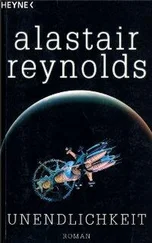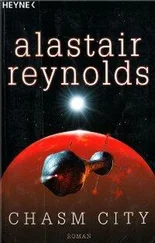“You said she was lucky?”
“A few of the Eighty are still running,” Taraschi said. “They’ve managed to keep doing so for a century and a half. Even the plague didn’t hurt them—they’d already migrated to secure computers in what we now call the Rust Belt.” He paused. “But they’ve been out of direct contact with the real world for some time now—evolving themselves in increasingly elaborate simulated environments.”
“And your mother?”
“Suggested I join her. Scanning technology’s better now; it doesn’t even have to kill you.”
“Then what’s the problem?”
“It wouldn’t be me, would it? Just a copy—and my mother would know it. Whereas now…” He fingered the tiny wound again. “Whereas now, I will definitely die in the real world, and the copy will be all that’s left of me. There’s time enough for me to be scanned before the toxin leads to any measurable deterioration in my neural structure.”
“Couldn’t you just have injected it?”
Taraschi smiled. “That would have been too clinical. I am killing myself, after all—nothing anyone should take lightly. By involving you, I prolonged the decision and introduced an element of chance. I might decide life was preferable and resist you, and yet you might still win.”
“Russian roulette would have been cheaper.”
“Too quick, too random, and not nearly so stylish.” He stepped towards her and—before she could draw back—reached for her hand and shook it, for all the world like someone concluding an auspicious business deal. “Thank you, Ana.”
“Thank you?”
Without answering he walked past her, towards noise. The sacrificial mound of heads was tumbling, footsteps clattering on the staircase. A cobalt vase shattered as the barricade gave way. Khouri heard the whisper of floatcams, but when the people emerged, they had none of the faces she expected. They were respectably dressed without being ostentatious, old-money Canopy. Three older men wore ponchos and fedoras and tortoiseshell floatcam glasses, the cameras hovering above them like attendant familiars. Two bronze palanquins rose behind them, one small enough to have held a child. A man with a plum matador’s jacket carried a tiny hand-held camera. Two teenage girls carried umbrellas painted with watercolour cranes and Chinese pictograms. Between the girls was an older woman, her face so colourless she might as well have been a lifesize origami toy, infolded, white and easily crushed. She fell to her knees in front of Taraschi, weeping. Khouri had never seen the woman before, but she knew intuitively that this was Taraschi’s wife and that the little toxin-filled swordfish had robbed her of him.
She looked at Khouri, her eyes limpid smoke-grey. Her voice, when she spoke, was bleached of anger. “I hope they paid you well.”
“I just did my job,” Khouri said, but she hardly managed to force the words out. The people were helping Taraschi towards the stairs. She watched them descend out of sight, the wife turning to direct one last reproachful glance at Khouri. She heard the reverberation of their retreat and the sound of footsteps across the terrazzo. Minutes passed, and then she knew that she was completely alone.
Until something moved behind her. Khouri spun round, automatically bringing the toxin gun to bear, another dart in the chamber.
A palanquin emerged from between two shrines.
“Case?” She lowered the gun—it was of little use anyway, with the toxin keyed so precisely to Taraschi’s biochemistry.
But this was not Case’s palanquin: it was unmarked, unornamented black. And now it opened—she had never seen a palanquin do that—divulging a man who stepped fearlessly towards her. He wore a plum matador’s jacket; not the hermetic clothing she might have expected from someone who feared the plague. In one hand he carried a fashion accessory: a tiny camera.
“Case has been taken care of,” the man said. “He’s of no concern to you from now on, Khouri.”
“Who are you—someone connected to Taraschi?”
“No—I just came along to see if you were as efficient as your reputation implied.” The man spoke with a soft accent which was not local—not from this system, nor the Edge. “And, I’m afraid, you were. Which means—as of now—you’re working for the same employer as myself.”
She wondered if she could put a dart in his eye. It would not kill him, but it might take the edge off his cockiness. “And who would that be?”
“The Mademoiselle,” the man said.
“I’ve never heard of her.”
He raised the lensed end of the little camera. It split open like a particularly ingenious Faberge egg, hundreds of elegant jade fragments sliding to new positions. Suddenly she was looking down the barrel of a gun.
“No, but she’s heard of you.”
Cuvier, Resurgam, 2561
He was woken by shouting.
Sylveste checked his tactile bedside clock, feeling the position of the hands. He had an appointment today; in less than hour. The commotion outside had beaten the alarm by a few minutes. Curious, he threw aside the sheets of his bunk and fumbled towards the high, barred window. He was always half-blind first thing in the morning, as his eyes stammered through their wake-up systems check. They threw planar sheets of primary colour across his surroundings, making it seem as if the room had been redecorated overnight by a squad of overenthusiastic cubists.
He pulled aside the curtain. Sylveste was tall, but he could not see through the little window—at least not at a useful angle—unless he stood on a pile of books appropriated from his shelves; old printed facsimile editions. Even then the view was less than inspiring. Cuvier was built in and around a single geodesic dome, most of which was occupied with six-or seven-storey rectangular structures thrown up in the first days of the mission, designed for durability rather than aesthetic appeal. There had been no self-repairing structures, and the need to safeguard against a dome failure had resulted in buildings which were not only able to withstand razorstorms, but which could also be pressurised independently. The grey, small-windowed structures were linked by roadways, along which a few electric vehicles would normally be moving.
Not today, though.
Calvin had given the eyes a zoom/record facility, but it took concentration to use, rather like that needed to invert an optical illusion. Stick figures, foreshortened by the angle, enlarged and became agitated individuals rather than amorphous elements of a swarm. It was not so that he could now read their expressions or even identify their faces, but the people in the street defined their own personalities in the way they moved, and he had become acutely good at reading such nuances. The main mob was moving down Cuvier’s central thoroughfare behind a barricade of slogan boards and improvised flagstaffs. Apart from a few daubed storefronts and an uprooted japonica sapling down the mall, the mob had caused little damage, but what they failed to see was the troop of Girardieau militia mobilising at the far end of the mall. They had just disgorged from a van and were buckling on chameleoflage armour, flicking through colour modes until they all wore the same calming shade of chrome-yellow.
He washed with warm water and a sponge, then carefully trimmed his beard and tied back his hair. He dressed, slipping on a velvet shirt and trousers followed by a kimono, decorated with lithographic Amarantin skeletons. Then he breakfasted—the food was always there in a little slot by the time the alarm rang—and checked the time again. She would be here shortly. He made the bed and upended it so that it formed a couch, in dimpled scarlet leather.
Читать дальше












